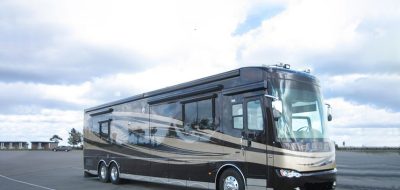It has been slightly over a month since my last post. Regrettably there was a tragic death in my family. My sister Deb was killed in an automobile accident on 28 Sept 08. We took our motorhome to Pa. to help with the funeral arrangements and to take care of personal matters. Deb will be sorely missed by us all.
With the cold weather quickly approaching I thought it would be a good time to briefly discuss RV batteries. Today I would like to offer 10 quick tips to help extend the life of your RV and automobile lead acid batteries. Battery maintenance is not that difficult but always keep safety in mind when you work around batteries. Lead acid batteries contain sulfuric acid which is extremely corrosive and can cause severe burns or even blindness. The hydrogen gas that batteries produce when they’re charging is very explosive. When you work around batteries you need to wear goggles and gloves, remove all jewelry and do not smoke or use any open flames.
Click on player to view the 10 RV battery quick tips video
Tip #1
Routine maintenance and recharging a discharged battery as soon as possible will extend the life of the battery.
Tip #2
Sulfation will occur when a battery’s state of charge drops below 80 %, or 12.4 volts. Recharging a battery at an 80% state of charge will prevent battery sulfation.
Tip #3
Never let a battery discharge below 10.5 volts. You can measure the voltage with a digital voltmeter. Measuring the voltage gives you a quick picture of the batteries depth of discharge so you know when they need to be recharged. Set the voltmeter on DC voltage and put the red lead on the positive terminal and the black lead on the negative terminal.
Tip #4
Reducing the battery’s depth of discharge will increase the life of the battery. A battery discharged to 50 % everyday will last twice as long as it would if it’s cycled to 80%.
Tip #5
RV’s have parasitic loads that will discharge the battery over time. Some but not all of these loads are LP gas leak detectors, the TV antenna power booster, clocks, stereos and appliance circuit boards. If your RV is equipped with a battery disconnect switch make sure it is in the OFF position when you are not using the RV or when it is in storage. If your RV is not equipped with a battery disconnect switch you can purchase a battery disconnect that installs directly to the battery.
Tip #6
Hot temperatures and overcharging kill batteries. During hot weather or during high usage check the batteries frequently. Checking the electrolyte levels and adding distilled water as required can save your lead acid batteries.
Tip #7
When you add water to a battery, use mineral free water. Distilled water is best. Regular tap water can cause calcium sulfation.
Tip #8
Properly charging your batteries needs to be done in stages. A bulk charge should be performed to return the battery to 90% of a full charge in the first few hours. An absorption charge is used for the remaining 10 percent to prevent any battery gassing and loss of water, and then a float charge to keep the battery fully charged.
Tip #9
Batteries should only be watered after charging unless the plates are exposed prior to charging.
Tip #10
To prevent water loss from bubbling and gassing leave the vent caps on batteries while charging.
Note:
The lead and plastic used to construct batteries can be recycled. More than 97% of all battery lead is recycled. Be sure and recycle your old batteries.
Happy Camping,
Mark Polk






Grace
Our battery for 5th wheel was dead when we got ready to de-winterize. It was two years old. I think we need at battery 101 course for newbies.
Mark Polk
Basil,
When we aren’t using our RV I use a product called the battery minder on the RV batteries. It’s a small battery charger, conditioner and maintainer. I connect it to the batteries, plug it in and leave it. It will never overcharge the batteries and it prevents sulfation. I have been using this for years now and it has solved my batteries from dying long before their time. I am not affiliated with this company or product, but if you would like more information go to this link and click on RV’s.
Basil Doucette
What is the best way to maintain an aux. battery in storage over the winter months.
Presently I have MH connected to AC from house. Will this cause battery to “dry out:”
Thanks
Basil
Cal Blumhorst
Mark, thanks for the clarification and helping me better understand what you were saying in Tips 2 & 4.
I have also used one (1) of the Battery Tenders several years across two 6-volt batteries in my MH; it worked beautifully. The manufacturer in fact recommends this hookup I believe, noting only that the batteries must be about equal in condition so a weaker unit hooked up in series this way, does not place a parasitic load on the stronger of the two.
Again, thanks for your work and patience answering our questions and concerns and enabling us to better enjoy this great and fun lifestyle.
tom hughes
I’m plugged into shore power almost all of the time. should i be disconnecting from shore power to use discharge the batteries once in a while or will it hurt the batteries by being plugged in.
Sam Haigh
Another suggestion for extended storage time.
Living in the northern part of Canada, my 5th wheel usually gets winterized early to mid-october and doesn’t get pulled out until early May. The batteries are usually pulled out and put into a warm place. (-40 isn’t good for any battery). Because of the longer storage period of these batteries I like to use them for other things like a voltage inverter, I can run some household appliances off of them until they are moderately drained and then I recharge them (usually at least once per month). This seems to keep them from going dead from stagnentation during the long storage periods. I used to go through a battery about every two years when I didn’t do this. My latest set are going on their 4th year and still going strong.
August Jones
Your comment re battery charger> You state you connect it to your batteries (plural). Do you connect one to one battery or is one required for each battery?
ken holliday
sorry – now i see your response – i misunderstood your #2 recommendation – i thought you were saying to use only 20% – not as you clarify – use 80% – now the recommendation makes sense – use only 50% before recharging – I agree
ken holliday
I see the comments on this sub ject (blog) and am looking for the responses – if any – by the article author.
I am new to blogging and am at the bottom of the learning curve- having a tough time getting started. the comments are nice but the replies would be even better.
i am specifcally looking for the answer to the seemingly contradicting recommendation of 80% and 50% discharge
Mark Polk
I appreciate everyones thoughts and prayers, it has been a difficult time.
Cal & Julie it does sound confusing the way these percentages appear in the tips, so let me try to explain it differently. In tip #2 if you cycle a battey (or discharge it) down to 80% you only have 20% of the batteries capacity left. At this state the battery starts to sulfate and sulfation is the leading cause of lead acid batteries dying. All I am stating here is if you recharge the battery in a timely manner you can prevent the sulfation from harming the battery, but if left in this state it will be ruined.
In tip#4 I am stating that if you only cycle the battery (or discharge it) down to 50% ,which means it still has 50% of its capacity left, (rather than cycling it down to where it only has 20% left and sulfation begins to occur) it will last much longer.
I probably should have said if you only cycle the battery to 50% and then recharge it it will last longer then cycling it to 80% before recharging.
Here is another tip I should have included. When we aren’t using our RV I use a product called the battery minder on the RV batteries. It’s a small battery charger, conditioner and maintainer. I connect it to the batteries, plug it in and leave it. It will never overcharge the batteries and it prevents sulfation. I have been using this for years now and it has solved my batteries from dying long before their time. I am not affiliated with this company or product, but if you would like more information go to this link and click on RV’s.
Happy Thanksgiving
Mark Polk
julie poole
I’m with Cal . Tips 2 and 4 Seem contradictory. I have a solar charger that keeps my batteries up at all times but with only using the rig every 4 months or so they seem to discharge too soon by all the compiled numbers . The first set of batterys lasted only 2 years and maybe less then 4 weeks use total.
Should I be discharging deeply or even once a month?
Cal Blumhorst
Mark, I’m sorry to hear that you lost your sister; our thoughts and prayers are with you.
I appreciate your instructive comments both on the web and on the RV TV show. In this case, concerning battery maintenance, I am confused concerning your recommendations about 50% vs. 80% discharge. In Tip #2 you state, “Recharging a battery at an 80% state of charge will prevent battery sulfation.” In Tip #4 however, you say, “A battery discharged to 50 % everyday will last twice as long as it would if it’s cycled to 80%.” The two statements appear contradictory (i.e., charging a battery at 80% will reduce sulfation but waiting until the battery reaches 50% charge will extend it’s life?) Where am I going wrong?
Thanks, Cal
John Christman
Mark,
So very very sorry to hear of the loss of your Sister. Any death is a tragedy, but that close to home and in that way, is especially hard to relate. I wish you and yours the very most.
Now, I think what you have to say about batteries is excellent–for LEAD ACID batteries. Perhaps you should have mentioned the alternatives such as Gel Cells and AGM’s. I don’t have to worry about most of your tips, since I have both Gels & AGM’s (more costly yes, but NO MAINTENANCE). I might have added Tip #11 and mentioned the all important “equalization” of batteries every month or so if they are used by full or extended timers. Also, a Trik-L-Charger works wonders for keeping both the house and chassis batteries up. But I know you have just limited amount of space to cover all this.
John Christman
PeteB
Our most sincere condolences to you and your family for the loss of your beloved sister.
Peter
Our sincere condolences to you and your family upon your loss, Mark. May God bless your hearts as you grieve and heal in His time.
Carl
So very sorry to hear about your sister, Mark~~~~~May God bless and be with you and your family ~~~~Thanks for all the info you are posting on this site~~~~I find your posts very interesting and helpful~~~~Carl
John Shelton
One time, several years ago, I attended a Gould battery seminar for service station owners (back when most retail gasoline outlets were actually service stations). Of course the question was asked about tap water vs distilled water. The answer to that question was, “Absolutely! Tap water will accelerate battery deterioration – – but it will take something on the order of 8 to 12 years for typical city tap water to have a significant effect. There are so many other factors that affect the life of a battery that it will have been replaced, probably at least twice, before the minerals in tap water would have become a factor contributing to the need to replace the battery.
I concluded from that statement that there is no real benefit to going to the extra effort, and expense, to use only distilled water for battery water replacement. In other words, it doesn’t hurt anything, just doesn’t extend the life of the battery by any measurable (not to mention significant) amount.
Tony and Arlene Lanet
Long story short…..we have been forced to live in our RV. We need some help re: auxilary batteries. We didn’t know it was a dry cell, so filled it with distilled water and chanrged it. When we shower, the battery goes to low and we have to start up the rig to charge the battery again. What are we doing wrong or what can we do to solve this problem. Neither one of us are auto mechanics
NEED SOME REAL HELP
THANKS ALOT